
Health communication is one of the vital ways through which the general public understands the complexities of healthcare.
In a world saturated with all kinds of information, navigating health-related messages, whether about diseases, treatments or preventive measures, requires effective communication.
If you are someone who has always been passionate about healthcare but hasn’t necessarily wanted to go to medical school, health communication may just be the career path for you.
The good news is the field of health communication offers you a variety of options for you to take. Here’s how a degree in health communication can help jumpstart a unique career in healthcare.
What is health communication?
Health communicators are public relations specialists who are in charge of effectively spreading public health messages. They are in charge of handling all internal and external communications at any given healthcare facility, hospital or organization. It's a pivotal field within public relations, dedicated to conveying information on topics concerning public health.

What professional skills should a health communicator have?
An effective health communicator excels in public speaking and possesses a strong command of the primary language of communication. Beyond mastering the language, they must also thrive in collaborative settings, being able to work effectively with a team or multiple departments. It’s important that health communicators be good at fostering unity among diverse groups of people.
Health communicators are entrusted with an array of responsibilities which include teamwork skills, adept communication across diverse stakeholders, public speaking prowess, and language proficiency. Their tasks range from crafting news releases, organizing impactful events, conducting press conferences, publishing research findings from teaching hospitals, to maintaining robust relationships with pertinent organizations.
Where do health communication professionals work?
Health communicators find employment opportunities in a diverse array of settings. These professionals often work in hospitals, healthcare facilities, and medical practices as part of robust communication teams.
Government agencies also employ health communicators, contributing to public health campaigns, spreading essential information and ensuring effective communication strategies for health policies.
Health communicators also work for health insurance and pharmaceutical companies. In those companies, they communicate policies, advancements and initiatives to both internal stakeholders and the public.
Non-profit organizations in the healthcare field also rely on healthcare communicators to effectively convey their messages.
including hospitals, healthcare facilities, government agencies, medical practices, health insurance and pharmaceutical companies, non-profit health organizations, wellness corporations, and public relations firms.
Health communicators also work in wellness facilities, public relations agencies, health publications and more.
How do I get into health communication?
Embarking on a career in health communications often begins with a bachelor’s degree. Typical majors associated with healthcare communications are public relations, journalism, communication, English, and business.
However, given that employers often seek candidates with specialized knowledge of public policy and health, a health communications degree may be the best option to pursue.
For instance, programs like the online bachelor's in health communication at institutions like PLNU cater to individuals seeking a focused education from the outset. These programs encompass not only communication and public relations principles but also delve into healthcare essentials, potentially including subjects like epidemiology, biology, health communication technology, health writing, and public health.
Programs like the one at PLNU can offer you a direct route to the field.
______
Who are you called to be?
Pursue your purpose at PLNU.
______
What can you do with a health communication degree?
Health communication opportunities are expanding, and there is an array of job opportunities to choose from. Here are some jobs and career paths you’d be able to pursue with a degree in health communications:
- Health Educator
- Professional who teaches healthcare courses in schools, communities or organizations.
- Social and Health Program Consultant
- Professional who works with professional agencies to come up with solutions to common health problems in the community.
- Public Relations Director
- Professional who is responsible for managing publicity for health organizations or medical facilities.
- Communications Director
- Marketing professional who is in charge of all communication efforts and strategy for a health or medical facility.
- Policy Analyst
- Professionals who takes note of strengths and weaknesses in public health policies, collects data, interpret it and write about what they’ve found. Could also involve giving presentations to think tanks or government agencies.
- Senior Communications Specialist
- Professionals that communicate hospital news to the public and engage in media relations.
- Medical Communications Account Manager
- Individuals In charge of handling healthcare clients for a PR agency.
- Physicians Relations Representative
- Public relations professionals that mediate and take care of the relationship between those physicians and hospitals or medical facilities.
- Corporate Communications Manager
- Communication managers for pharmaceutical and health insurance companies.
- Technical Writer
- Individuals that translate technical healthcare or medical jargon into publications or content that the general public can understand. They may also write for scientific audiences like the medical community.
Next steps
A degree in health communication isn't just a career choice; it's a gateway to crafting impactful, informative, and influential healthcare narratives that shape public understanding and drive positive health outcomes.
A bachelor’s degree in health communications is the perfect jumping point to start your career in this field and PLNU’s online bachelor’s in health communication can offer you a direct route into it.